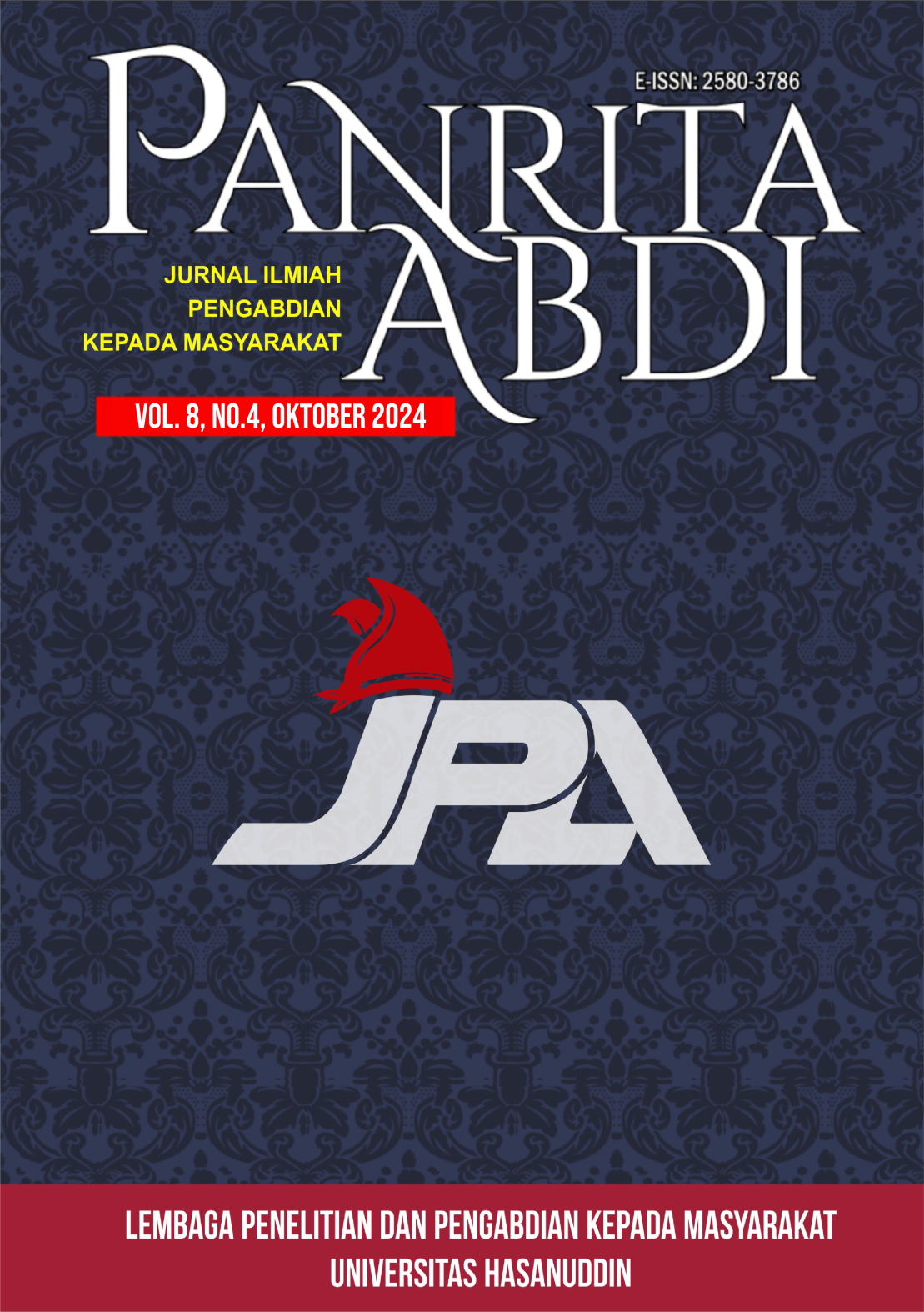PENINGKATAN LITERASI DIGITAL TENTANG UPAYA HIDUP CERDIK DAN IDENTIFIKASI RISIKO PENYAKIT TIDAK MENULAR BAGI SISWA MA PONDOK PESANTREN JAMI’ATUL QURRO
Keywords:
CERDIK, lifestyle, non-communicable diseases, teenagersAbstract
In the digital era, the younger generation needs to develop digital literacy to maintain physical and mental health when interacting with the digital world. This community service activity was attended by 55 respondents who were Madrasah students at the Jamiatul Qurro Palembang Islamic Boarding School in the form of a short education about the CERDIK principle for students using power points followed by initial health screening anthropometric index )The average age is 14.96 years, and the majority are male (54.55%). The average body mass index was 20.78 ± 4.07, which was normal and tended to be higher in women 21.04 ± 4.56. The average systolic blood pressure was 113.91 ± 9.75 mmHg, diastolic pressure 75.73 ± 7.35. From the respondents' anthropometric measurements, it was found that the average waist circumference was 71.67 ± 9.71, hip circumference 81.9 ± 12.95, arm circumference 24.81 ± 3.97, and neck circumference 31.48 ± 3.91. The average waist, arm, and neck circumference tend to be higher in men, while the average hip circumference tends to be higher in women. --- Di era digital, penting bagi generasi muda untuk mengembangkan literasi digital agar mereka tetap menjaga kesehatan fisik dan mental saat berinteraksi dengan dunia digital. Top of FormKegiatan pengabdian kepada masyarakat ini diikuti oleh 55 responden yang merupakan siswa MA Pondok Pesantren Jamiatul Qurro Palembang berupa edukasi singkat mengenai upaya hidup CERDIK bagi para siswa dengan menggunakan power point yang dilanjutkan dengan skrining awal kesehatan, indeks antropometri (. Rata-rata usia 14,96 tahun dan mayoritas berjenis kelamin laki-laki (54,55%). Rata-rata indeks massa tubuh 20,78 ± 4,07 yang terkategori sebagai normal (IMT antara 18.5-24,9) dengan kecenderungan lebih tinggi pada perempuan 21,04 ± 4,56. Rata-rata tekanan darah sistolik 113,91 ± 9,75 mmHg, tekanan diastolik 75,73 ± 7,35. Dari pengukuran antropometri responden didapatkan rata-rata lingkar pinggang 71,67 ± 9,71, lingkar panggul 81,9 ± 12,95, lingkar lengan 24,81 ± 3,97, dan lingkar leher 31,48 ± 3,91. Rata-rata lingkar pinggang, lingkar lengan dan lingkar leher cenderung lebih tinggi pada laki-laki, sedangkan rata-rata lingkar panggul cenderung lebih tinggi pada perempuan.
References
Aceves-Martins, M., Godina-Flores, N. L., Gutierrez-Gómez, Y. Y., Richards, D., López-Cruz, L., García-Botello, M., & Moreno-García, C. F. (2022). Obesity and oral health in Mexican children and adolescents: systematic review and meta-analysis. Nutrition Reviews, 80(6), 1694–1710. https://doi.org/10.1093/nutrit/nuab088
Gaciong, Z., Siński, M., & Lewandowski, J. (2013). Blood pressure control and primary prevention of stroke: Summary of the recent clinical trial data and meta-analyses. Current Hypertension Reports, 15(6), 559–574. https://doi.org/10.1007/s11906-013-0401-0
Gaziano, T. A., Bitton, A., Anand, S., Abrahams-Gessel, S., & Murphy, A. (2010). Growing Epidemic of Coronary Heart Disease in Low and Middle-Income Countries. Current Problems in Cardiology, 35(2), 72–115. https://doi.org/10.1016/j.cpcardiol.2009.10.002
Jacob, C. M., Hardy-Johnson, P. L., Inskip, H. M., Morris, T., Parsons, C. M., Barrett, M., … Baird, J. (2021). A systematic review and meta-analysis of school-based interventions with health education to reduce body mass index in adolescents aged 10 to 19 years. International Journal of Behavioral Nutrition and Physical Activity, 18(1), 1–22. https://doi.org/10.1186/s12966-020-01065-9
Khaliq, A., Wraith, D., Nambiar, S., & Miller, Y. (2022). A review of the prevalence, trends, and determinants of coexisting forms of malnutrition in neonates, infants, and children. BMC Public Health, 22(1), 879. https://doi.org/10.1186/s12889-022-13098-9
Khan, R., Sharma, A., Ravikumar, R., Parekh, A., Srinivasan, R., George, R. J., & Raman, R. (2021). Association Between Gut Microbial Abundance and Sight-Threatening Diabetic Retinopathy. Investigative Ophthalmology & Visual Science, 62(7), 19. https://doi.org/10.1167/iovs.62.7.19
Khoe, L. C., Widyahening, I. S., Ali, S., & Khusun, H. (2022). Assessment of the obesogenic environment in primary schools: a multi-site case study in Jakarta. BMC Nutrition, 8(1), 19. https://doi.org/10.1186/s40795-022-00513-y
Lek, D., Haveman-Nies, A., Bezem, J., Zainalabedin, S., Schetters-Mouwen, S., Saat, J., … van Setten, P. (2021). Two-year effects of the community-based overweight and obesity intervention program Gezond Onderweg! (GO!) in children and adolescents living in a low socioeconomic status and multi-ethnic district on Body Mass Index-Standard Deviation Score and quality o. EClinicalMedicine, 42, 101217. https://doi.org/10.1016/j.eclinm.2021.101217
O’Brien, K. S., Latner, J. D., Puhl, R. M., Vartanian, L. R., Giles, C., Griva, K., & Carter, A. (2016). The relationship between weight stigma and eating behavior is explained by weight bias internalization and psychological distress. Appetite, 102, 70–76. https://doi.org/10.1016/j.appet.2016.02.032
Ozumut, S. H., Erguven, M., & Besli, E. (2020). Obesogenic Environment in Childhood : Implications of High Socioeconomic Level in a Developing Country Çocukluk Çağında Obezojenik Çevre : Gelişmekte Olan Bir Ülkede Yüksek Sosyoekonomik Düzeyin Getirdikleri. 236–241. https://doi.org/10.5222/MMJ.2020.99836
Salwa, M., Atiqul Haque, M., Khalequzzaman, M., Al Mamun, M. A., Bhuiyan, M. R., & Choudhury, S. R. (2019). Towards reducing behavioral risk factors of non-communicable diseases among adolescents: Protocol for a school-based health education program in Bangladesh. BMC Public Health, 19(1), 1–9. https://doi.org/10.1186/s12889-019-7229-8
Sari, L. M., & Ardianto, A. J. (2021). Hubungan Tingkat Pengetahuan Terhadap Perilaku "CERDIK" pada Penderita Hipertensi Selama Masa Pandemi Covid-19 di Wilayah Kerja Puskesmas Gulai Bancah Bukti Tinggi. Jurnal Kesehatan Tambusai, 2, 368–374. https://doi.org/10.31004/jkt.v2i4.3236
Sitaula, D., Shrestha, N., Timalsina, S., Pokharel, B., Sapkota, S., Acharya, S., … Dhakal, S. (2022). Knowledge, attitude and practice regarding diabetes and hypertension among school students of Nepal: A rural vs. urban study. PLoS ONE, 17(8 August), 1–16. https://doi.org/10.1371/journal.pone.0270186
Yekaninejad, M. S., Badrooj, N., Vosoughi, F., Lin, C. Y., Potenza, M. N., & Pakpour, A. H. (2021). Prevalence of food addiction in children and adolescents: A systematic review and meta-analysis. Obesity Reviews, 22(6), 1–12. https://doi.org/10.1111/obr.13183
Downloads
Published
How to Cite
Issue
Section
License
Copyright (c) 2024 Iche Liberty, Samsuryadi, Indri Seta Septadina, Gita Dwi Prasty, Rohan Sabloak, Arnold Yosua Raja Pasaribu, Esti Sri Ananingsih

This work is licensed under a Creative Commons Attribution-NonCommercial-NoDerivatives 4.0 International License.











